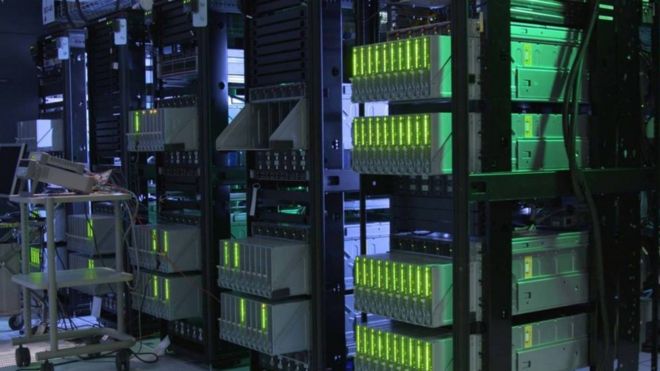Hewlett Packard Enterprise (HPE) Co, better known as HP in India, has unveiled a new computer prototype that it claims could handle more data than any similar system in the world. The California-based firm said the prototype contains 160 terabytes of memory, capable of managing the information from every book in the U.S. Library of Congress five times over. It is the latest prototype from 'The Machine' research project by HP, which aims to create super-fast computers by designing them around memory.
Traditionally, the way processors, storage and memory interact can bog down computers. 'The secrets to the next great scientific breakthrough, industry-changing innovation or life-altering technology hide in plain sight behind the mountains of data we create every day,' said Meg Whitman, CEO of Hewlett Packard Enterprise. 'To realize this promise, we can't rely on the technologies of the past, we need a computer built for the big data era.' The prototype underscores HP's ambition to lead computer technology as huge data sets place new strains on devices. It has never been possible to hold and manipulate whole data sets of this size in a single-memory system, and this is just a glimpse of the immense potential of Memory-Driven Computing. With that amount of memory, it will be possible to simultaneously work with every digital health record of every person on earth; every piece of data from Facebook; every trip of Google's autonomous vehicles and every data set from space exploration all at the same time—getting to answers and uncovering new opportunities at unprecedented speeds.
We at Laptop Repair Service Center would like to also tell you about the real life application of this new super computer. Where on one hand because the computer is capable of simultaneously analyzing every person in the world's medical records, it will have the information needed to identify matches of people, diagnoses and treatments or therapies that worked best for people most similar to the patient as opposed to treatments that work best for the average patient. While on the other hand systems built on HP's Memory-Driven Computing architecture could deliver enormous gains in analytic capacity and provide actionable insights within the attention span of a shopper and can affect the retail sector in a huge way.
In the future HP foresees the unit having a memory-based system with up to 4,096 yottabytes of data – more than 250,000 times the size of today's digital universe and the firm has suggested that when it is capable of analyzing that much data at once, it will have the ability to 'discover correlations we could have never conceived before'. 'And that ability will open entirely new frontiers of intellectual discovery, HP shared in a press release.
In addition to assisting in different areas on Earth, the technology could also be useful in space - the computer could also assist astronauts in missions to mars. Those making the journey could rely on the machine to figure out a range of issues that could arise, allowing them to formulate solutions and save them for future events. Teams could also rely on the on board computers for help, rather than communicating with Mission Control.
While the prototype remains years away from being commercially available, HP is already bringing some of the tech from its research program to market. Still, companies and the scientific community have yet to concur on what technology will best serve users. 'You need computing that scales up with the size of the data set,' said Kathy Yelick, a professor of electrical engineering and computer sciences at the University of California at Berkeley. This is it for now, stay tuned for more informative and knowledgeable articles and don't forget you read it first here with us at HP Laptop Service Center in Indore.

No comments:
Post a Comment